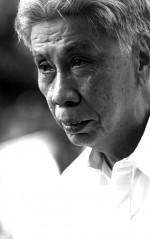The “cartographic”—what? “Cartographic aggression” is shorthand for redrawing maps to gobble up territory, writes Australian Sinologist Geremie Barmé. And last week’s region-wide protests over Beijing’s clamping of new fishing access rules, in disputed portions of the South China Sea, is the latest edition.
The directive to secure permission from Hainan province swept chunks within the Philippines’ 327-kilometer Exclusive Economic Zone, and those of other countries.
Can “the legislature of a Philipppine province, say Batanes, decides who can fish or not in some two million square kilometers of water?” Inquirer asked in an editorial titled: “Provocative.” This is part of “China’s increasingly naked attempts at unilateral control” over contested areas.
“All states can fish in the high seas,” Malacañang said Sunday. “When it comes to the EEZ, that is under our jurisdiction.” Vietnam and Taiwan slammed the Beijing directive as “illegal and groundless.” “Dangerous,” the US snapped.
Nonsense, a Chinese Foreign Ministry spokesman retorted. The 2014 rules were “technical revisions” of existing laws.
The conflict opens a “window of opportunity” said the Angara Center for Law and Economics. We should explore crafting joint fishery agreements with China. A tenth of fish catch worldwide come from this region.
“Coastal countries with overlapping claims will benefit through joint regulation of fishing management,” said former Senator Edgardo Angara. “All would be losers in armed conflict.”
Coastal passages from Singapore through Malaysia to Japan, Russia and North America ferry over US $1.2 trillion in goods annually. The region’s sea-beds contain 5.4 billion barrels of oil and 55.1 trillion cubic meters of natural gas, US estimates say. That’s about 80 percent of Saudi Arabia’s reserves. Nothing firm about reported oil fields in Aloguinsan town, Cebu, the Department of Energy says.
A steep rise in shale oil reserves will make the US net exporter, instead of world’s leading importer, International Energy Agency reports. The US may overtake Russia, as the world’s biggest gas producer by 2015. It’d become “all but self-sufficient” in energy needs by 2035. Reliance on oil from Middle East exporters is ending—and changing the global balance of power.
China is the world’s biggest energy consumer. It imports 60 percent of it’s crude. The bulk of the 10.5 to 11 million barrels of oil that China burns daily comes from the Middle East. Tankers sail through the Strait of Malacca “choke point” between Malaysia and Indonesia en route to China.
China has the world’s largest wind power base. It invests in and imports via pipelines from Central Asia, Russia and the new pipeline route from the Indian Ocean through Myanmar.
China National Offshore Oil Co. has invited foreign oil companies to offer bids to explore potential blocks off the coast of Vietnam. And Beijing has increasingly used non-military boats to make their points. Last month, Beijing declared that it would expand the fleets of fishing vessels it will be sending to disputed regions.
Overlapping territorial claims to sovereignty and maritime boundaries are normally resolved through a.) combination of customary international law, b.) adjudication before the International Court of Justice or International Tribunal for Law of the Sea, c.) arbitration under Annex VII of the United Nations Convention on the Law of the Sea (Unclos). The Philippines has chosen the arbitration option.
China has ratified Unclos, writes Mohan Malik, a professor in Asian security at Asia-Pacific Center for Security Studies, in Honolulu. The treaty by and large rejects “historically based” claims— precisely the type which Beijing periodically asserts.
The UN’s Law of the Sea agreement rejects justification by historical right. “China has, historically speaking, about as much right to claim the South China Sea as Mexico has to claim the Gulf of Mexico for its exclusive use, or Iran the Persian Gulf, or India the Indian Ocean.
“Significantly, in its territorial disputes with India, Burma and Vietnam, Beijing took the position that its land boundaries were never defined, demarcated and delimited. But now, when it comes to islands, shoals, and reefs in the South China Sea, Beijing claims otherwise.”
“Power grows out of the barrel of a gun,” Mao Ze Dong wrote. China’s claim is backed by growing armed forces and navy.
Freedom of navigation and control over South China Sea shipping lanes will be among the major global political issues of the 21st century, New York Times points out in “Game of Shark and Minnows.” Thus, the US “pivot” to this region includes altering the roughly 50-50 balance of naval forces between the Pacific and the Atlantic. That would become 60-40 by 2020.
“Europe is a landscape; East Asia a seascape,” Robert Kaplan wrote in Foreign Affairs. “Therein lies a crucial difference between the 20th and 21st centuries… The spaces between major population centers are overwhelmingly maritime. The physical contours of East Asia augur a naval century”
China’s land borders are more secure than at any time since the 18th century Qing dynasty. “China is psychologically bent to erase two centuries of foreign transgressions on its territory—forcing every country around it to react.”
East Asia, or more precisely the Western Pacific, which is quickly becoming the world’s new center of naval activity, presages a fundamentally different dynamic. Robert Kaplan adds: “South China Sea is the future of conflict.”
For some Southeast Asian countries, tomorrow arrived yesterday.
Disclaimer: The comments uploaded on this site do not necessarily represent or reflect the views of management and owner of Cebudailynews. We reserve the right to exclude comments that we deem to be inconsistent with our editorial standards.

